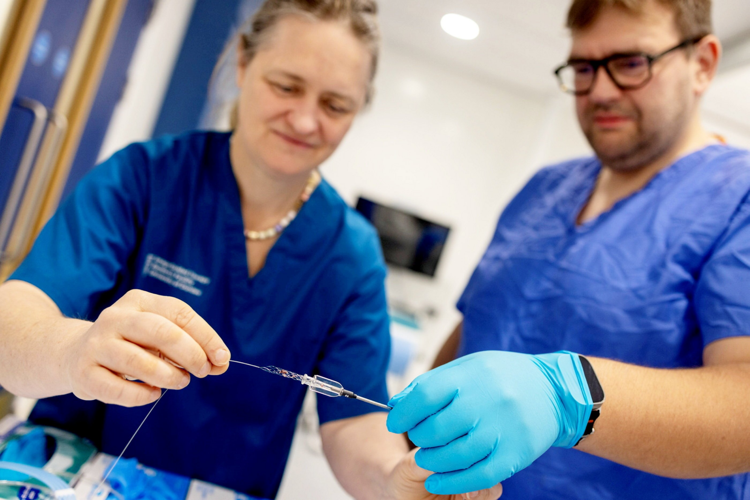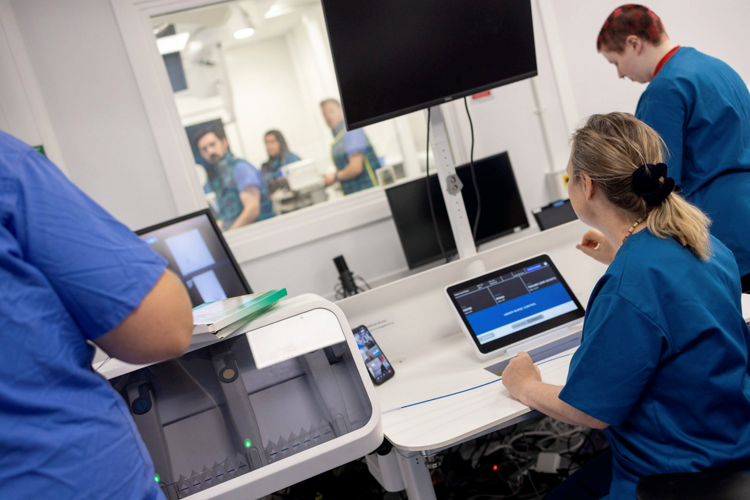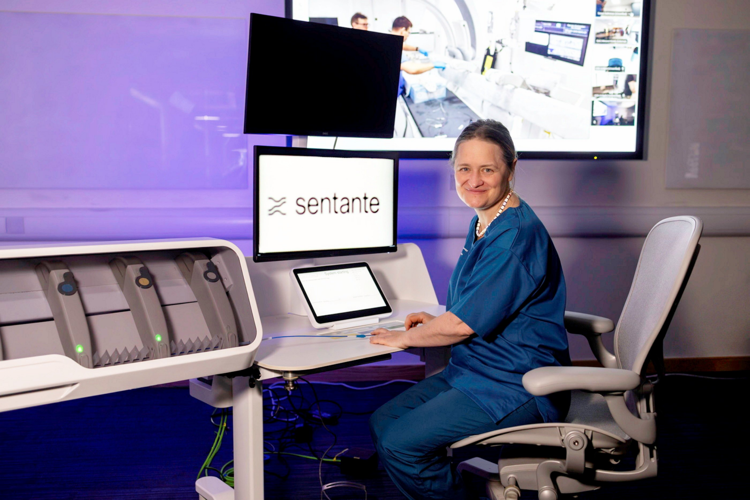
(University of Dundee via SWNS)
By Elizabeth Hunter
Surgeons have performed the world's first remote brain operations - one transatlantic - on stroke victims using cutting-edge robots.
Dr. Iris Grunwald, Director of the Image Guided Therapy Research Facility (IGTRF) at the University of Dundee, performed the first-ever remote thrombectomy on a human cadaver.
She carried out the operation from Ninewells Hospital using a specialist machine - while the donated cadaver remained at the university.
Just hours later, neurosurgeon Ricardo Hanel performed the same surgery on a live human patient in Dundee - from 4,000 miles away in Jacksonville, Fla.
The surgery, which removes blood clots from a patient's brain following a stroke, can greatly improve a patient's quality of life - but specialists able to perform the surgery are lacking in the UK.

(University of Dundee via SWNS)
Dr. Grunwald said: "By the time patients reach a specialist center, there’s often no brain left to save.
"Every six minutes delay in receiving treatment equates to a 1% lesser chance of a good outcome.
“For example, here in Dundee we're covering the north of Scotland - so a patient coming from Inverness, or one of the islands, would have a long distance to travel.
"The answer lies in expanding expertise locally through cross-specialty training, or by using robotic technology, such as Sentante, that lets experts operate remotely.”
The robot used by Dr. Grunwald was developed by Lithuanian MedTech company Sentante.
To carry out the surgery, the robot was connected to catheters and wires, while the surgeon recreates the surgery using joysticks - as the robot performed the same movements in real time.
“As a neurointerventionist, it is remarkable to feel the same fine control and resistance through a robotic interface as during a live procedure," said Dr. Grunwald.
"Sentante’s technology truly bridges the gap between operator and patient, no matter the distance.
"Sentante’s robotic platform redefines what is possible in endovascular treatment today.
"It is precision, safety and access to treatment - all in one innovation.”

(University of Dundee via SWNS)
Dr. Hanel added, “Tele neurointervention will allow us to decrease the gap and further our reach to provide one of the most impactful procedures in humankind - the thrombectomy - to more people.
"To operate from the US to Scotland with a 120 millisecond (blink of an eye) lag is truly remarkable.”
Edvardas Satkauskas, co-founder and CEO of Sentante, said, “The human cadaveric models at Dundee are fantastic.
"This is the reason we have worked with them - this is probably the only site in the world that can do this type of research.
“For an ischaemic stroke, the difference between walking out of hospital and a lifetime of disability can be just two to three hours.
"Today, patients are often transported long distances to reach one of a limited number of thrombectomy centers.
"With Sentante, the specialist comes to the patient over a secure network and performs the entire procedure remotely - with the same tactile feel and control they have at the bedside.”
Remote thrombectomies have previously been conducted on a silicon model, a 3D printed replica and on an animal.
The team now hope to take part in clinical human trials next year.
- An ischaemic stroke occurs when an artery is blocked by a clot.
This cuts off blood and oxygen supply to the brain, and brain cells lose function and die.
The best treatment is a thrombectomy, where a specialist uses catheters and wires to remove the clot.























(0) comments
Welcome to the discussion.
Log In
Keep it Clean. Please avoid obscene, vulgar, lewd, racist or sexually-oriented language.
PLEASE TURN OFF YOUR CAPS LOCK.
Don't Threaten. Threats of harming another person will not be tolerated.
Be Truthful. Don't knowingly lie about anyone or anything.
Be Nice. No racism, sexism or any sort of -ism that is degrading to another person.
Be Proactive. Use the 'Report' link on each comment to let us know of abusive posts.
Share with Us. We'd love to hear eyewitness accounts, the history behind an article.